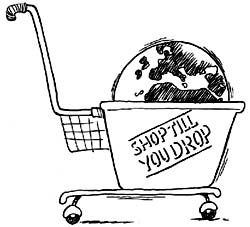Free, not fair
 INTERNATIONAL NEGOTIATIONS ON TRADE AND ENVIRONMENT
INTERNATIONAL NEGOTIATIONS ON TRADE AND ENVIRONMENT
History of conflict - The world initiated a multilateral trading system with the establishment of General Agreement on Tariffs and Trade ( gatt ) in 1946 to promote trade liberalisation.
- The Uruguay Round, held between 1986 and 1994, led to the creation of the wto in 1994 to administer the global framework of international trade rules and agreements.
- In 1995, a committee on trade and environment ( cte ) was established under the wto . The first cte report was inconclusive in its attempt to reconcile trade and environment.
A landmark judgement of the wto 's dispute settlement board and appellate body was equally non-committal in addressing the controversial issue of whether one country can take unilateral action against others. Four Asian countries objected to a us ban on shrimp imports on grounds that turtle excluder devices were not used while catching the shrimp, leading to the deaths of endangered turtles. The wto ruled against the us , but only for the manner in which the country had enforced its certification programme - not because it amounted to 'extra-jurisdictionality', meaning enforcement of domestic us laws on the other four countries.
Globally acceptable standards for ppm s will open a Pandora's box of trade conflicts. How shrimps are caught, is tuna dolphin-safe, are animals grown in open stalls or factories - all these will become matters of international concern.
Trade wars do not take place merely between industrialised and developing countries. The us has attempted to use wto to force European countries to buy its genetically modified products and hormone-treated beef. European countries have resisted this attempt on the grou nds of the threat this poses to public health.
Challenges ahead - Efforts to set globally acceptable ppms will be an enormous trade disadvantage to developing countries.
- Existing disparities between the trade regime and multilateral environmental agreements ( mea s), such as those between the wto 's Trade Related Intellectual Property Rights ( trips ) regime and the Convention on Biological Diversity, should be thoroughly addressed.
- As was evident at the 1999 wto ministerial meeting held in Seattle, usa , the civil society of the North supports the use of trade as a lever to control the environmental behaviour of poorer countries. This goes to prove that Northern groups cannot be trusted to represent Southern issues. Developing country governments will have to support and encourage their own groups.
Problem
Economic globalisation has led to increased trade conflicts between countries. As developing countries liberalise trade policies to compete globally, Northern countries invent new barriers to protect their industries from cheaper imports from developing countries. They object to the less stringent production and processing methods (PPMs) in developing countries, most often on environmental and labour grounds. For developing countries, eager to participate in the markets of rich industrialised countries, free trade under the North-driven World Trade Organisation (WTO) has meant more costs and little advantage.
Developing countries see trade restrictions as a form of 'protectionism' used by industrialised countries to protect their own companies from cheaper competition. Northern countries have also resorted to exporting domestic legislation (and morality) to other countries to 'protect' the environment.
Related Content
- The Punjab Canal and Drainage Bill, 2023
- Survival of the richest: how we must tax the super-rich now to fight inequality
- Food Safety and Standards (Food Products Standards and Food Additives) First Amendment Regulations, 2023
- Question raised in Rajya Sabha on Benefit of MSP to Majority of Farmers, 26/07/2019
- The relationships between democratic experience, adult health, and cause-specific mortality in 170 countries between 1980 and 2016: an observational analysis
- Anaemia-free Krishna district shows the way
